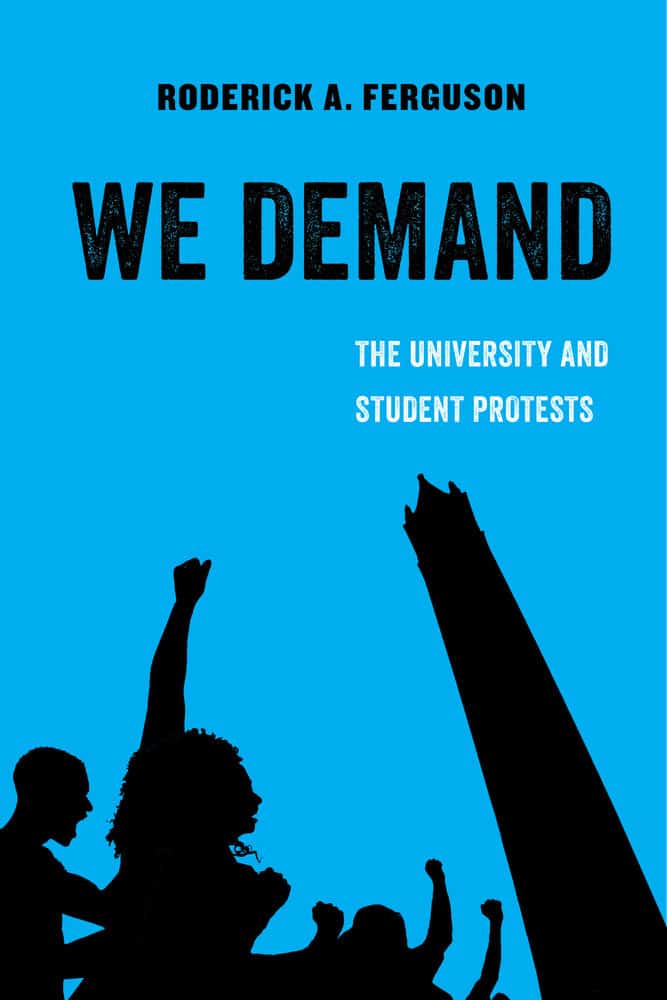By Roderick A. Ferguson, author of We Demand: The University and Student Protests
This guest post is part of a blog series of contributions by authors in American Studies Now, an e-book first series of short, timely books on significant political and cultural events.
On April 24, 2017 the Berkeley College Republicans and the Young America’s Foundation filed a lawsuit against UC Berkeley for cancelling visits by conservative authors Ann Coulter and David Horowitz over security concerns, stating: “Though UC Berkeley promises its students an environment that promotes free debate and the free exchange of ideas, it had breached this promise through the repressive actions of University administrators and campus police.” The suit goes on to state that the administration restricts conservative speakers differently than liberal ones.
It’s important to note that the furor over conservative speakers is a well-and-long choreographed enterprise. Indeed, the movements of that choreography were planned well over forty years ago in former Chief Justice Lewis Powell’s secret but generative document popularly known as “The Powell Memorandum.” In 1971 Powell sent the memorandum to the U.S. Chamber of Commerce, a private organization of business leaders, warning them about the mobilization against capitalism taking place in U.S. society, generally, and on college campuses specifically.
note that the furor over conservative speakers is a well-and-long choreographed enterprise. Indeed, the movements of that choreography were planned well over forty years ago in former Chief Justice Lewis Powell’s secret but generative document popularly known as “The Powell Memorandum.” In 1971 Powell sent the memorandum to the U.S. Chamber of Commerce, a private organization of business leaders, warning them about the mobilization against capitalism taking place in U.S. society, generally, and on college campuses specifically.
Through the memorandum, Powell attempted to give business leaders a primer on “best practices” for garnering ideological support for corporations and the executives that run them. The category “balance” was central to that effort. Balance would become a powerful ideological tool in that offensive. In the memo, Powell used the category to construct American colleges and universities as inhospitable to and therefore in need of conservative viewpoints. As he stated, “The difficulty is that balance is conspicuous by its absence on many campuses, with relatively few members being of conservative or moderate persuasion and even the relatively few often being less articulate and aggressive than their crusading colleagues.” As an ideological weapon, “balance” was a neutral sounding category that helped to construct business elites as vulnerable minorities against powerful liberal and leftist bullies. In a moment of minority insurgency, “balance” would encourage people to see the business community as a minority among minorities but one that needed to be liberated from its peers.
Part of the ideological offensive represented by “balance” involved using the category to reorganize knowledge within the university so that it would favor conservative social projects. For instance, in a discussion of why a “continuous program” for evaluating social scientific textbooks is necessary, Powell stated, “The objectives of such evaluations should be oriented toward restoring the balance essential to academic freedom. This would include assurance of fair and factual treatment of our system of government and our enterprise system, its accomplishments, its basic relationship to individual rights and freedoms, and comparisons with the systems of socialism, fascism, and communism. Most of the existing textbooks have some sort of comparisons, but many are biased, superficial, and unfair.” The memo is important because it reveals how the issue of balance was never simply about the rights of a singular group of speakers or the free circulation of a particular set of viewpoints. “Balance” was designed from the very beginning to leverage institutional and social conditions so that conservative formations might enjoy dominance while maligning and subjugating their critics.
 Roderick A. Ferguson is Professor of American Studies, Gender and Sexuality Studies, and African American Studies at the University of Illinois-Chicago. He is also the co-director of the Racialized Body research cluster at UIC. From 2007 to 2010, he was Associate Editor of the American Studies Association’s flagship journal American Quarterly. Beginning this July, he will serve as president-elect of the American Studies Association for a year before becoming president of the organization in July 2018.
Roderick A. Ferguson is Professor of American Studies, Gender and Sexuality Studies, and African American Studies at the University of Illinois-Chicago. He is also the co-director of the Racialized Body research cluster at UIC. From 2007 to 2010, he was Associate Editor of the American Studies Association’s flagship journal American Quarterly. Beginning this July, he will serve as president-elect of the American Studies Association for a year before becoming president of the organization in July 2018.
His book We Demand: The University and Student Protests is available as an e-book now, before the print format publishes this August.

